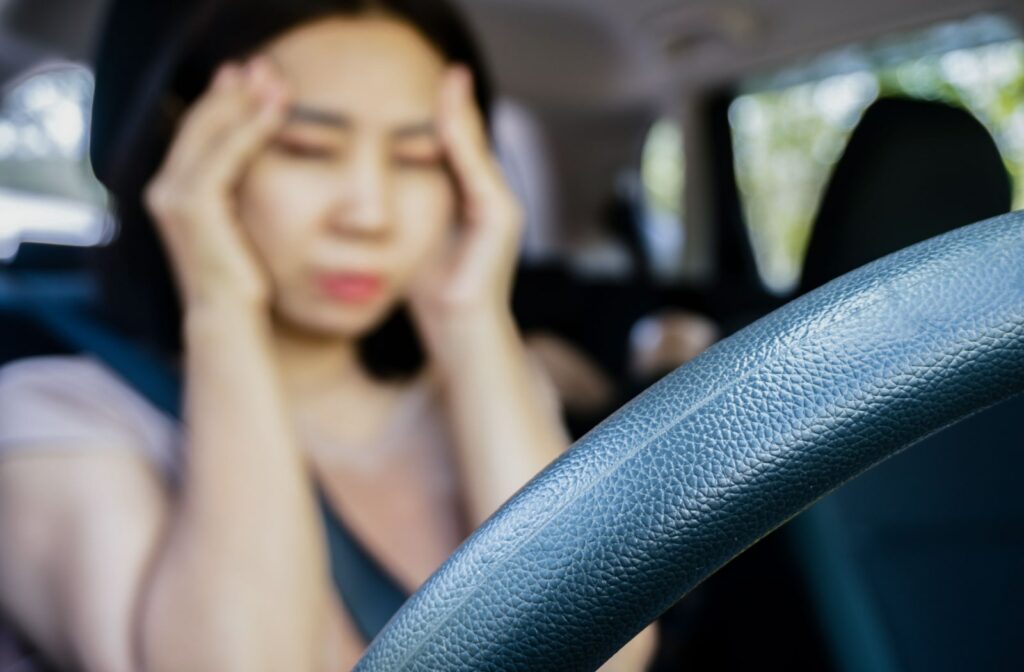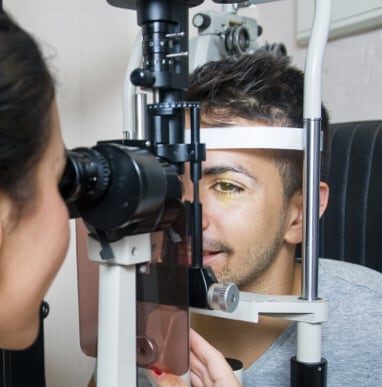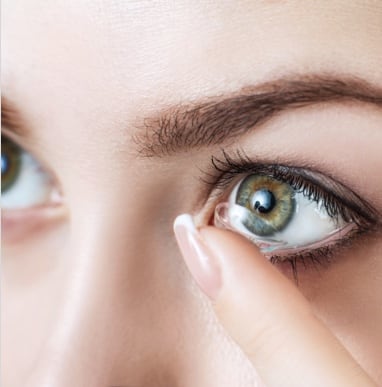Driving is something we all do every day, whether it’s for work, taking the kids to their activities, or just getting around town. But if you start feeling dizzy or unsteady behind the wheel, it can turn a simple task into a major headache. Not only is dizziness while driving dangerous and increases the risk of accidents, but it can also make being a passenger uncomfortable.
Dizziness while driving can be caused by problems like binocular vision dysfunction, uncorrected vision problems, inner ear disorders, and other medical issues.
Consider visiting your optometrist for a comprehensive eye exam and a discussion about your symptoms. They can provide treatment options to make your driving experience more comfortable.
Dizziness While Driving: Additional Symptoms
Often, dizziness doesn’t develop alone. You may experience other symptoms like:
- Car Sickness
- Sensitivity to bright lights
- Flare from headlights, streetlamps, traffic lights, and roadside signs
- Disorientation
- Blurry vision
- Double vision
- Problems with depth perception
- Dysfunction in your peripheral vision
Binocular Vision Dysfunction & Dizziness
When both eyes work together, they provide the brain with different spatial information, which is merged to create a single image. This process is known as binocular vision, which is crucial for depth perception, 3D vision, and gauging the distance between objects.
Vertical heterophoria is a type of binocular vision dysfunction that occurs when the eyes are slightly misaligned. If left untreated, your eye-focusing muscles can become strained and overused, leading to dizziness, headaches, neck pain, and balance issues.
Binocular vision dysfunction can be a genetic or developmental condition caused by:
- Traumatic brain injuries
- Concussions
- Strokes
- Facial nerve dysfunction
- Neurological conditions

Other Causes of Dizziness While Driving
While binocular vision dysfunction is a common cause of dizziness while driving, other conditions can also cause it.
Inner Ear Disorders
The inner ear is responsible for maintaining balance in your body with intricate canals and fluid that send critical information to the eyes, joints, and muscles. Inner ear disorders can cause dizziness while driving, including:
Motorist’s vestibular disorientation syndrome (MVDS) is a condition that explains the feeling of dizziness while driving. It occurs due to the dynamic nature of the driving experience.
Your vestibular system (the link between your inner ear and brain) judges spatial awareness, head orientation, and head movement speed. Your visual system then provides information about other vehicles, potential obstructions, and road signs. MVDS can cause the vestibular system to become disoriented, leading to dizziness while driving.
Low Blood Sugar
Low blood sugar (hypoglycemia) is a common cause of dizziness. While it’s typically associated with diabetes, it can happen to anyone. When blood sugar levels drop, the brain doesn’t receive enough glucose to function correctly, which can lead to dizziness and confusion.
Other symptoms of low blood sugar include:
- Hunger
- Shakiness
- Light-headedness
- Fatigue
- Sweatiness
- Blurry vision
- Weakness
Maintain a balanced diet and keep snacks in the car to avoid dizziness due to low blood sugar.
Medications
Some medications can cause dizziness as a side effect. In some cases, your pharmacist or medical professional may recommend you avoid driving.
Medications that can cause drowsiness, dizziness, and confusion include:
- Anticonvulsants
- Anti-hypertensives
- Antibiotics
- Antidepressants
- Anti-psychotics
- Anti-inflammatories
Talk to your doctor immediately if you experience dizziness while driving when taking medication.
Visual Problems
Visual problems like uncorrected refractive errors can also cause dizziness while driving. Refractive errors like nearsightedness or farsightedness can cause blurry vision at various distances and contribute to eye strain, making driving difficult.
Regular eye exams can help detect and treat any vision problems and help prevent dizziness while driving.
Treating Dizziness While Driving
If binocular vision dysfunction is making you dizzy when driving, merely addressing the symptoms won’t provide long-term solutions.
Vision therapy can help ease dizziness by targeting your eye misalignment. Specialty lenses and visual exercises can help reduce eyestrain and keep you safer while on the road.
Get Relief From Dizziness
Dealing with dizziness while driving can be a pretty dangerous issue that increases your anxiety. It’s important to identify what’s causing the problem to prevent it from happening again.
If you experience dizziness while driving, take our comprehensive binocular vision dysfunction questionnaire and schedule an appointment with Vision Care Center for diagnosis. These are the first steps to restoring your balance.












